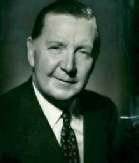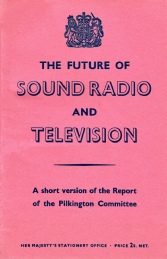© 2014-

Almost There !
Commercial radio lobby
The 1930’s stations which beamed programmes from continental land based transmitters to Britain had demonstrated that there was a demand for commercially funded, popular entertainment as an alternative to the staid BBC output.
The outbreak of World War 2 brought an abrupt end to these transmissions and, apart from Radio Luxembourg, none of the commercial stations returned to the air after the end of the War because many European governments introduced regulations giving their ‘state broadcasters’ monopoly rights over the airwaves.
However, there were businessmen looking for ways to establish commercial radio stations, in particular to serve Britain -
Amongst tho se keen to pursue commercial broadcasting in the UK w
se keen to pursue commercial broadcasting in the UK w as the Chairman of the Pye group -
as the Chairman of the Pye group -
Another interested party was Gordon McLendon, who own ed many radio stations in the USA and offered a similar proposal to the Irish government. However, he withdrew plans when the Irish authorities constantly delayed a decision over the introduction of a commercial television service. A third interested party was Frenchman, Charles Murchison who operated cross border radio stations in Andorra, Monte Carlo and Germany. McLendon later became involved in the Scandinavian offshore station, Radio Nord and was one of the backers and main advisers to Radio London.
ed many radio stations in the USA and offered a similar proposal to the Irish government. However, he withdrew plans when the Irish authorities constantly delayed a decision over the introduction of a commercial television service. A third interested party was Frenchman, Charles Murchison who operated cross border radio stations in Andorra, Monte Carlo and Germany. McLendon later became involved in the Scandinavian offshore station, Radio Nord and was one of the backers and main advisers to Radio London.
The lobby for commercially funded broadcasting in Britain was partly appeased with the introduction of Independent Television (ITV) in 1955. However, there was still a demand for a similar service in radio. In 1960 the British Gover nment set up the Pilkington Committee (under the chairmanship of industrialist Sir Harry Pilkington) to look into the future of broadcasting generally in the UK. In its final report, published in June 1962, the Committee concluded (wrongly) that the British public did not want commercial radio and it went on to suggest that the BBC should introduce a network of local stations to stifle the need for local commercial radio.
nment set up the Pilkington Committee (under the chairmanship of industrialist Sir Harry Pilkington) to look into the future of broadcasting generally in the UK. In its final report, published in June 1962, the Committee concluded (wrongly) that the British public did not want commercial radio and it went on to suggest that the BBC should introduce a network of local stations to stifle the need for local commercial radio.
The expected outcome of the Pilkington Committee inquiry was that it would favour the introduction of commercially funded radio and by the time the Committee’s report was published there were over 100 companies registered to bid for the anticipated commercial radio licences. The Committee’s final conclusion -
C O Stanley
Gordon McLendon





Ground
Floor
Back to




State Monopolies and International Agreements









Back to Gallery index

Almost There ! (2)
